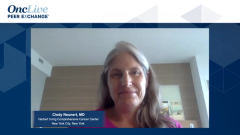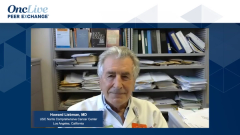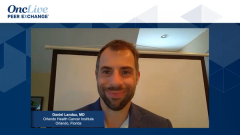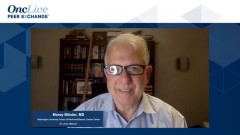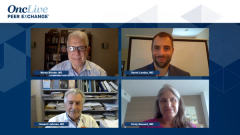
Other Novel Therapeutic Agents in Immune Thrombocytopenia
Before closing out their discussion on novel treatment approaches in ITP, experts review data behind FcR-, BTK-, and CD38-targeted therapies.
Episodes in this series

Transcript:
Howard Liebman, MD: I think you’ve got FcRn inhibitors. What people must understand is that the so-called neonatal receptor is not just involved in transplanting antibodies to the infant, although it’s important in that. It also is necessary for the long life of the antibodies. So, when you block those receptors and you don’t recycle by this receptor and your IgG, it’s catabolized. Antibodies drop within 2 weeks. I’ve been involved in these trials, and one of the published trials I was involved in I developed the protocol. And so, yeah, they are very effective in a small subgroup, but they have potential. The big question is that can you get long-term remissions, or do you have to stay on them long-term to suppress these antibodies? If you have long-term suppression of total antibiotic, because it doesn’t even mean bring the auto antibiotic down, it brings all antibodies down intermittently, whether you’re going to have problems. The only hint that it might have a good remission that might last longer is that we did do an autoimmune anemia trial with a FcRn inhibitor. We had a woman who went into remission for only 5 doses given within 5 weeks for 2.5 years for autoimmune anemia. But autoimmune anemia is not the same. Then the next thing is the BTK [Bruton tyrosine kinase] inhibitors, and there’s only one out there, rilzabrutinib. The phase 2 data was impressive enough that it got published in the New England Journal of Medicine. I’ve never seen that. It may be to the skill of the first author, who is a personal friend.
Morey Blinder, MD: And very skilled.
Howard Liebman, MD: But I think as a participant in the trial, I won’t go into it, but I’m very impressed in our experience. Right now, we’ve put the most patients on for the United States here, so we’re seeing it. We’ll see. And again, I mentioned the fact that the responses occur very early, very rapidly, and that’s because again, you’re doing a fostamatinib effect on phagocytosis because of the role of the BTK enzyme in phagocytosis. Now we’re getting daratumumab and the anti-CD38 antibodies that are used in treatment of multiple myeloma. And there’s some data about daratumumab in patients who developed Evans syndrome associated with transplant. It was very impressive. I tried it and it was a real art to get approval from the company in one of our very refractory Evans cases. Unfortunately, we didn’t see much of a response, but I think mainly the patient didn’t want to proceed with a second round of treatment. I can’t say anything, but there are some trials now with daratumumab and a related anti-C38 antibody out there, so we’ll have to wait. And the concept is that in trouble with ITP [immune thrombocytopenia] is with Rituxan. You may get rid of some B cells, but you don’t get rid of the long-lived plasma cells. They’re just sitting out there and they’re in the spleen too now. We now know those plasma cells are in the spleen and they’re making that antibody even after you give Rituxan. That’s why you may not get a good response long-term with Rituxan or any response at all upfront.
Morey Blinder, MD:Do you think that speaks to maybe in a lot of settings why earlier therapy with these immunosuppressive drugs works better than waiting till you have a stable of plasma cells making antibodies and it’s too late?
Howard Liebman, MD: I think there’s Robert McMillan, [MD, Scripps Research,] one of the deans of this field show that with time patients develop more and more antibodies against platelets, even antibodies against intercellular components of platelets. The longer you have the disease, you’re destroying platelets, you’re processing the platelet antigens, you’re making new antibodies, you’re making new T cells, and you’re creating a more refractory case for you. The earlier you treat them potentially you treat them aggressively. You’re probably going to see more long-term remissions. That’s because even a combination, as you mentioned with TPO agonists, along with everything else could add something on. I think I would rather do that than put it on mycophenolate early on, but I’m just giving my prejudice. You need to do the studies to prove it, and it needs to be more than one study, but I think by nature in the community, more and more people are doing this using TPO [thrombopoietin receptor]
agonists early, even doing some immune modulation early. I think I have more patience now than I think I’ve ever had in 30 years of treating patients with ITP who are off of drugs and reasonably stable remissions than I ever had. And so, I think we’re in a phase now where we’re really moving forward in this disease. But I’ll say one thing. I’m going to cite a paper. I happen to be a minor coauthor, Doug Cines, [MD, Perelman School of Medicine, University of Pennsylvania,] 2009, the ITP syndrome, probably one of the most cited papers I was ever involved in with ITP. And the reason is, as he said, it’s a very complex disease. There’s not one disease, it’s a syndrome. I give credit to a brilliant hematologist Douglas Cines who really told us that we have to find multiple strategies to treat this very complex disease.
Morey Blinder, MD: I think those are points well taken. It’s really interesting to hear your perspective about how many patients that you have with ITP in remission. I think I certainly have a lot of patients from remission too, but I think I noted to my nurse last week that we have 5 patients right now whose cumulative platelet count adds up to 50,000. There are still people with ITP that struggle. I think we do see a fair number of those where at least second-line therapy or multiple second-line therapies and then beyond are required. Let me just ask Cindy: Do you see any of these emerging therapies as being potentially useful in pediatric ITP?
Cindy Neunert, MD: Yes. I think we’ve got a long way to go before they’ll get approved for pediatric use, but we would love to see some of these agents become a variable for children. I think we still have huge unmet needs in the pediatric space as well. Similar to what you all have in the adult patients when you get these refractory patients. We’re falling back on MMF [mycophenolate mofetil], we‘re falling back on Sirolimus, which is another agent that we‘re using a little bit, particularly in the more Evans [syndrome]-type profile. I do think if we can see that there are safe options that provide good durable responses, obviously, we’d be just as excited. I do think with the Bruton tyrosine kinase, as you pointed out, one of the exciting things is how early the response was. I feel as though I know what’s in my toolbox for maintenance therapy for refractory patients. I think one of the things that we all struggle with is what do you do when the patient is in the hospital leading and not responding to any acute therapies and you’re just trying to bide your time until whatever second-line therapy you put them on kicks in? And I think that’s another huge unmet need is emergent management while you’re waiting for some of these maintenance therapies to kick in. Seeing evidence that they work rather quickly is also encouraging.
Transcript edited for clarity.


